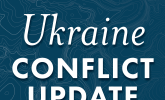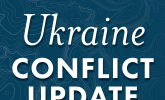Russian Offensive Campaign Assessment, March 24
March 24, 2022 - ISW Press
Russian forces continue to make slow but steady progress in Mariupol, entering the city center on March 24, but conducted few offensive operations elsewhere in the country. Ukrainian counterattacks northwest of Kyiv in the past several days continue to relieve pressure on the city, and Russian forces continued to dig in. Ukrainian forces repelled limited Russian attacks northeast of the city and around Kharkiv.










